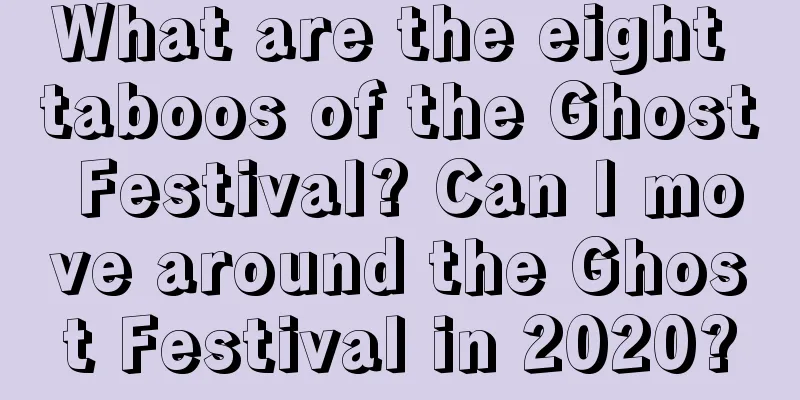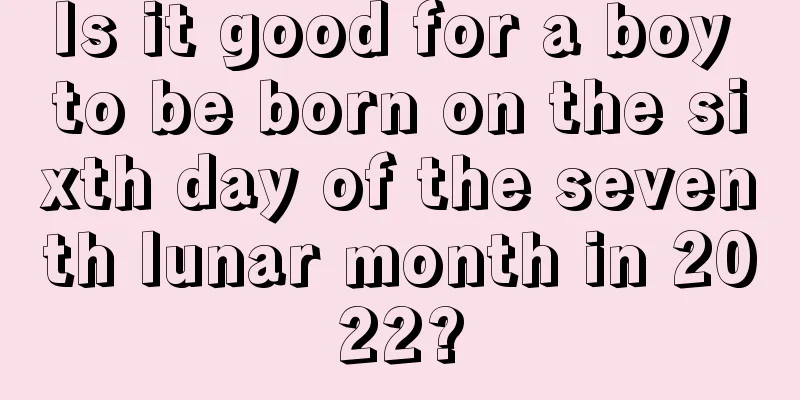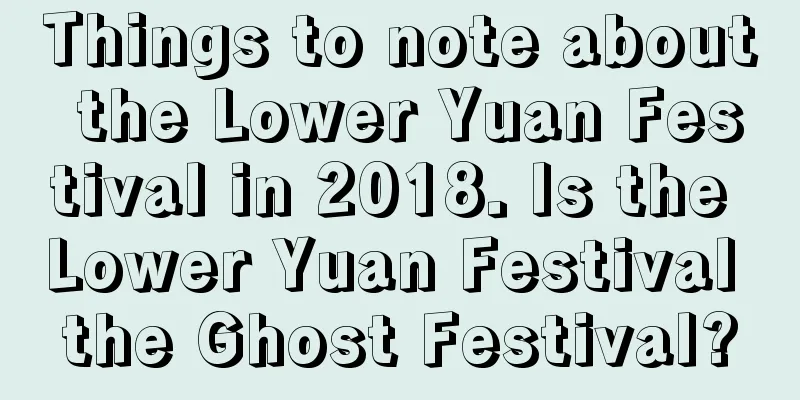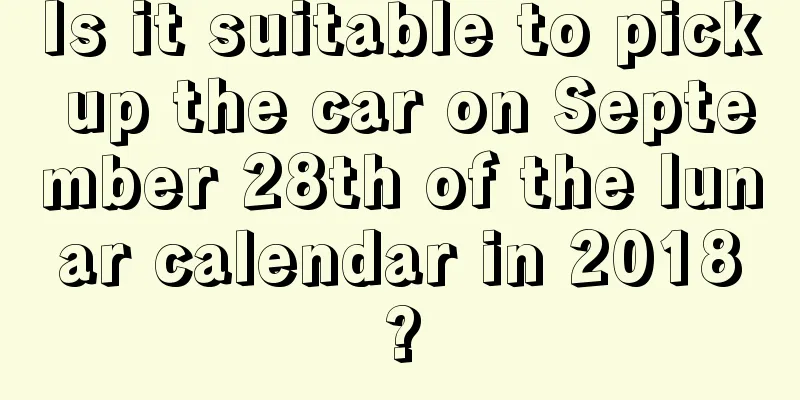What are the customs and etiquette on the first day of the first lunar month? What are the taboos on the first day of the first lunar month?
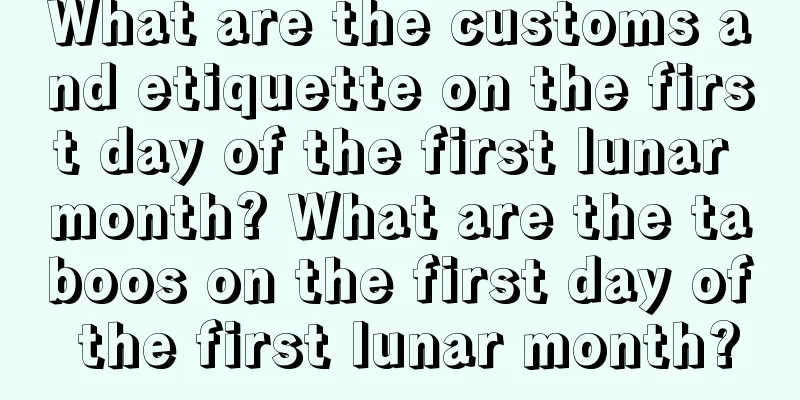
Introduction: The first day of the first lunar month is an important festival in our country's tradition, and the first day of the first lunar month has many customs and etiquette. So what are the customs and etiquette of the first day of the first lunar month, and what are the taboos on the first day of the first lunar month? The key to a good year begins in spring. For more knowledge about the first month of the lunar calendar, please pay attention to the 2019 first month of the lunar calendar special topic on Shuimoxiansheng.com.What are the customs and etiquette on the first day of the Lunar New Year?Customs on the first day of the first lunar month: New Year greetingsNew Year's greetings are a traditional custom among the Chinese people. It is a way for people to bid farewell to the old and welcome the new and express good wishes to each other. In ancient times, the original meaning of the word "New Year's greetings" was to congratulate the elders on the New Year. New Year greetings usually start at home. On the morning of the first day of the New Year, after getting up, the younger generation should first greet the elders and wish them good health, longevity and all the best. After receiving the greetings, the elders will distribute the "lucky money" prepared in advance to the younger generations. After paying New Year's greetings to the elders at home, people will also congratulate each other with a smile when they meet outside, and say auspicious words such as "Congratulations on making a fortune", "Good luck in all seasons", and "Happy New Year". Neighbors or relatives and friends will also visit each other to pay New Year's greetings or invite each other for drinks and entertainment. Customs on the first day of the first lunar month: opening firecrackers On the morning of the Spring Festival, firecrackers are set off first to wish for good luck when the door is opened. These are called "door-opening firecrackers". After the sound of firecrackers, the ground is covered with red fragments, as bright as brocade, which is called "Mantanghong". At this time, the streets were full of auspiciousness and joy. Customs on the first day of the first lunar month: fortune-telling In the old days, the Chinese people would predict the harvest of the new year based on the weather during the first few days of the new year. The theory originated from Dongfang Shuo's "Sui Zhan" in the Han Dynasty, which said that eight days after the year, the first day is the chicken day, the second day is the dog day, the third day is the pig day, the fourth day is the sheep day, the fifth day is the cow day, the sixth day is the horse day, the seventh day is the human day, and the eighth day is the grain day. If the day is sunny, the things it governs will flourish; if the day is cloudy, the things it governs will not prosper. Later generations followed this custom and believed that it was auspicious if the weather was clear, windless and snowless from the first to the tenth day of the lunar month. Later generations developed the fortune-telling into a series of sacrificial and celebratory activities. There is a custom of not killing chickens on the first day of the lunar month, not killing dogs on the second day, not killing pigs on the third day... and not executing people on the seventh day. Customs on the first day of the first lunar month: Sticking pictures of chicken In ancient times, people painted chickens on doors and windows during the Spring Festival to drive away evil spirits. The "Xuan Zhong Ji" written by a person from the Jin Dynasty talked about the celestial rooster on the Dushuo Mountain mentioned above. It said that when the sun just rose and the first ray of sunlight shone on the big tree, the celestial rooster crowed. As soon as it crows, all the chickens in the world start to crow. Therefore, the chicken cut during the Spring Festival actually symbolizes the celestial chicken. However, there is also a saying in ancient mythology that the chicken is a transformed version of the Chongming bird. It is said that during the reign of Emperor Yao, friendly nations offered tribute of a kind called the Chongming bird, which could ward off evil spirits. Everyone welcomed the arrival of the Chongming bird, but the tribute envoys did not come every year. So people carved a wooden Chongming bird, or cast a bronze Chongming bird and placed it at the door, or painted a Chongming bird on doors and windows to scare away evil spirits and ghosts so that they would not dare to come again. Because the Chongming bird looks like a chicken, people later gradually changed to painting chickens or cutting window decorations and pasting them on doors and windows, which became the source of paper-cutting art in later generations. In ancient my country, people attached great importance to chickens and called them "birds with five virtues." "Han Shi Wai Chuan" says that it has a crown on its head, which represents literary virtue; it has spurs on its feet that enable it to fight, which represents martial virtue; it dares to fight when the enemy is in front of it, which represents courage; it shares food with its own kind, which represents benevolence; it keeps watch on time and announces the dawn, which represents faith. Therefore, people not only cut the chicken during the Chinese New Year, but also designate the first day of the New Year as Chicken Day. Customs on the first day of the first lunar month: Staying up all night on New Year's Eve Staying up all night on New Year's Eve is one of the most important traditional activities during the Chinese New Year, and the custom has a long history. The earliest record can be found in "Fengtuzhi" by Zhou Chu of the Western Jin Dynasty: On New Year's Eve, people give gifts to each other, which is called "gifting the year"; they invite each other to drink and eat, which is called "saying goodbye to the year"; the young and the old gather together to drink and give blessings, which is called "dividing the year"; everyone stays up all night waiting for dawn, which is called "keeping the year". "One night connects two years, and the fifth watch divides two days." On New Year's Eve, the whole family gets together, eats the New Year's Eve dinner, lights candles or oil lamps, sits around the stove and chats, waiting for the moment to bid farewell to the old and usher in the new, and stays up all night, symbolizing the driving away of all evil plagues and diseases, and looking forward to a prosperous new year. This custom gradually became popular. In the early Tang Dynasty, Emperor Taizong of Tang, Li Shimin, wrote a poem called "Shousui": "The cold winter snow is gone, and the warmth comes in the spring breeze." To this day, people still have the habit of staying up on New Year's Eve to welcome the new year. In ancient times, staying up all night to celebrate the New Year had two meanings: for the elderly, it was to "bid farewell to the old year" and to cherish time; for the young, it was to extend their parents' lives. Since the Han Dynasty, the time when the old year turns to the new year is generally midnight. Spring Festival Food Customs In the ancient agricultural society, housewives would start preparing food for the New Year starting from the eighth day of the twelfth lunar month. Because it takes a long time to pickle cured meat, it must be prepared as early as possible. Many provinces in my country have the custom of pickling cured meat, among which the cured meat in Guangdong Province is the most famous. Steamed rice cake. Because rice cake is homophonic to "年高" (meaning "year is high") and has a variety of flavors, it has become a must-have seasonal food in every household. The styles of rice cakes include square-shaped yellow and white rice cakes, which symbolize gold and silver, and imply getting rich in the New Year. What are the taboos on the first day of the Lunar New Year?It is said that the first day of the first lunar month is the birthday of the broom. You cannot use the broom on this day, otherwise it will sweep away your luck and money, and attract "broom stars" and bring bad luck.If you must sweep the floor, you must sweep from the outside to the inside. You cannot throw water or garbage outside on this day, for fear of losing money. Today, many places still keep the custom of cleaning the house on New Year's Eve, not sweeping the house or taking out the garbage on New Year's Day, and preparing a large bucket to hold waste water, which is not poured out on that day. The new wave of annual fortune in 2019 has already changed. Calculate your own fortune in advance, correct your mistakes if there are any, and encourage yourself if there are none, so that the new year will be smooth and safe. To calculate your new fortune in 2019, please click on the [Premium Calculation] below to learn about your new fortune. I wish you peace and happiness in the new year! |
<<: Is the first day of the first lunar month in 2019 an auspicious day? Is today a good day?
>>: What are the auspicious and inauspicious days on the 26th day of the 12th lunar month in 2018?
Recommend
What zodiac sign’s birthday is February 30th in the lunar calendar in 2021?
Everyone has his or her own zodiac sign. Do you kn...
What is the zodiac sign of a baby born on the second day of the fifth lunar month in 2022, and what is his personality like?
In May, the pomegranate flowers are bright to the ...
Why shouldn’t the toilet face south? What are the requirements for the direction of the toilet?
Introduction: The toilet in the bathroom is very ...
Is the 28th day of the sixth lunar month in 2020 a good day? Is it suitable for opening a new store?
June is a hot month and the lotus flowers are in ...
Is the twenty-third day of the last month of 2019 an auspicious day for breaking ground and moving graves? What Feng Shui should we pay attention to?
Introduction: Generally, an auspicious day must be...
What are the benefits of wearing silver jewelry in the Year of the Rat 2020? Can it ward off evil spirits?
Many people were given silver bracelets or necklac...
Can I open a business on November 14, 2021 in the lunar calendar? Is it an auspicious day?
The eleventh month of the lunar calendar is also k...
Is October 22nd of the lunar calendar 2017 a good day? Is it an auspicious day?
Introduction: In our country’s traditional customs...
Is it a good idea to move house on the third day of the ninth lunar month in 2017? Can I move into a new home?
It is such a deep autumn, so golden, and so fruit...
Can we welcome the God of Wealth on the 14th day of the fourth lunar month in 2017? Where is the auspicious position of the God of Wealth?
Introduction: In our folk legends, the God of Weal...
Is it a good time to travel on March 11, 2018 in the lunar calendar? How auspicious or inauspicious is the day and time?
The third month of the lunar calendar is a great t...
What festival is on the 29th day of the twelfth lunar month in 2019? What should we do on the 29th day of the twelfth lunar month?
Introduction: The twelfth lunar month is an import...
Analysis of the lucky numbers of pig babies born at different times on New Year’s Day, January 1, 2020!
Introduction: Children born at different times on ...
Is it a good idea to sign the contract on April 14th of the lunar calendar in 2021? How to choose the venue for signing a contract?
Green locust trees and tall willows are swallowing...
Is it okay to hold a sacrifice one day after the Chinese Valentine's Day on the eighth day of the seventh lunar month in 2020? How many days are left before the Chinese Valentine's Day in 2020?
Introduction: Generally, it is necessary to choose...
